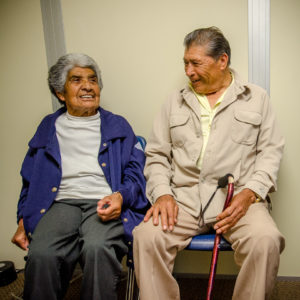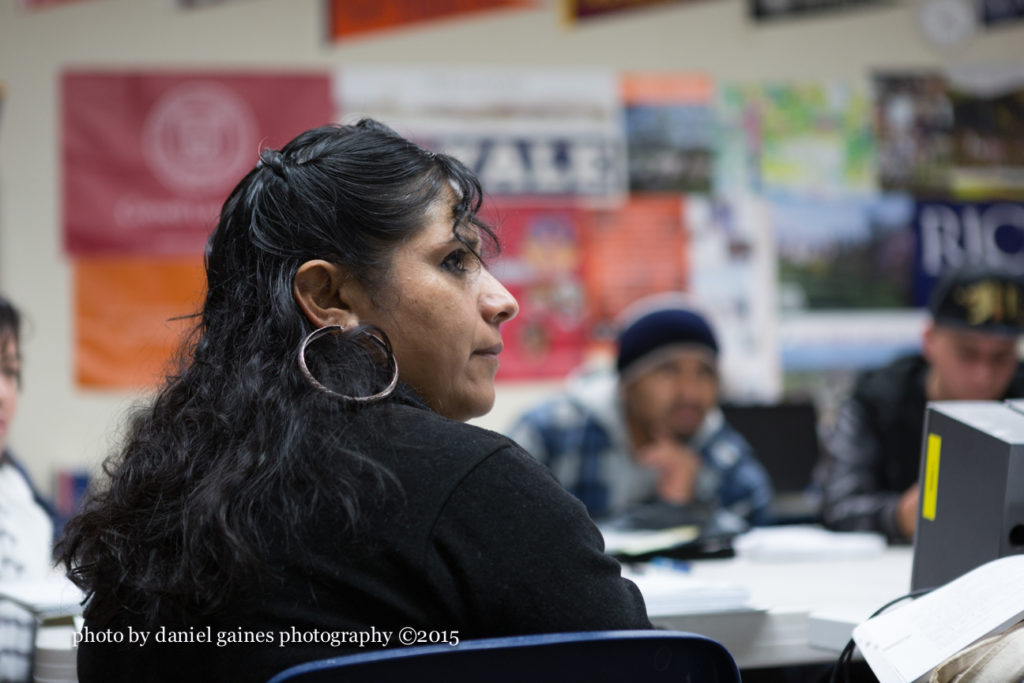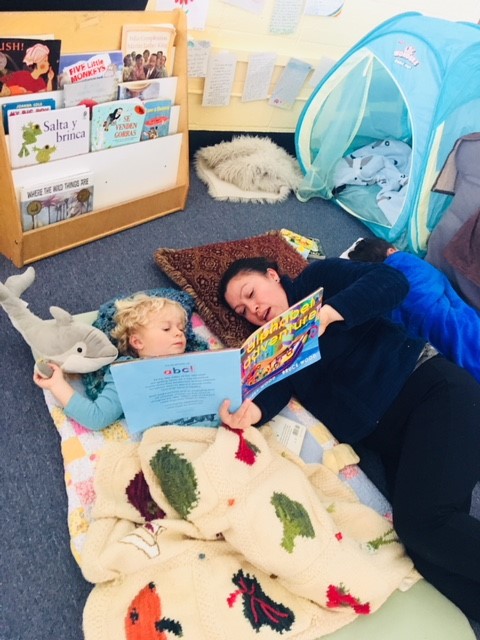
Carol Young-Holt and her husband Dave are in their mid-70s. They live in La Honda. As the years pass, staying active and healthy and preserving their independence are very important goals for both of them.
“We live on a big, wild property and we’re alone. We are in the throes of wondering, ‘How long can we do this?’ – And I know others are in a similar situation,” says Young-Holt. She’s referring to other seniors she knows who also want to age in place at home, in La Honda, Loma Mar, San Gregorio and Pescadero.
Those are difficult questions for any senior. But living on the rural South Coast comes with an extra layer of challenges. Take Young-Holt’s husband, who has macular degeneration. His eyesight is stable enough for now. Someday, if he can no longer drive, it could really hamper his independence. Everything – the grocery store, the doctor, friends, culture and entertainment – is a long car ride away.
The distance issue also complicates getting support from a home health aide, should one ever be necessary. The nearest home health aides are stationed in Half Moon Bay, and so are all the other relevant senior services.
“We don’t have the population to support those kinds of things, and it’s a huge conundrum for the whole area,” adds Young-Holt, who is also vice-chair of the Puente Board of Directors.
“Demographically, the Baby Boomers are getting older; they’re going to start needing more services, possibly all at once. It’s happening everywhere, and we realized that it was also going to happen to us here on the South Coast,” says Madeleine Kane, Community Health Manager for Puente. When Puente staff noticed a dramatic increase – 46% in the number of local seniors participating in Puente’s community programs and services between 2015 and 2017 — the time was ripe to ask how Puente can be ready and responsive.
Results of a survey at the Puente Health Fair revealed where there were gaps for services to seniors. Distance was a major preoccupation: “Providers don’t just come over here” was a common refrain. Most respondents wanted to know about options for home care because aging in place is a priority. Access to affordable health insurance and quality health care were also high up on the list: some seniors report struggling with high insurance premiums and meeting basic needs for housing and food while on a fixed income. Some people asked for help with drafting an Advance Healthcare Directive. Puente will offer a workshop on that topic at its next Health Fair, as well as other workshops that are directly helpful to seniors.
“If anything, Kane said, those needs are intensely compounded by the fact that seniors on the rural South Coast are more isolated and have less access to the services they require to age safely in place.
Puente regularly connects seniors with paratransit transportation to doctor’s appointments in Half Moon Bay and elsewhere. Puente’s Community Health Workers, or ‘Promotoras’ make house calls and provide bilingual health outreach. Puente’s own staff handle most health insurance enrollments free, including Medicare. Puente’s Thursday night clinic cares for many seniors who are managing chronic health problems. (The clinic only serves individuals who meet low-income requirements. This excludes many seniors in the area).
Other needs are the province of specialists. Fortunately, there are many specialized services in the Half Moon Bay Area. The Coastside Adult Day Health Center and Senior Coastsiders are important resources for health therapies and socializing, whereas no senior center exists on the South Coast. Mission Hospice & Home Care in San Mateo offers care to those who are terminally ill or facing a life-threatening illness and some of its employees happen to live on the Coastside.
“We do have quite a few services that already support seniors like Zumba, mental health services and the outpatient clinic (if you have MediCal or ACE insurance). But we’re learning that seniors have some unique challenges and what exists might not be enough to support them best, so that’s why we’re asking for input about what other services seniors need” explains Kane.
Rather than try to reinvent the wheel on its own, Puente scheduled a meeting in late January with representatives of all the above organizations, plus Puente’s own health staff and Executive Director, and a handful of board members, including Young-Holt.
Several interested seniors also attended, especially from La Honda. Lynnette Vega was one of them.
“At the meeting it was wonderful to meet other people who are as concerned as I am about seniors,” says Vega. “People need each other for information and support. Connectedness is super important on many different levels. That’s a big thing.”
Vega has lived in La Honda since 1969. She has spent much of her career working with seniors at places like Foothill College and the Los Gatos Recreation Department. Now as a senior herself, she knows first-hand what the issues are and she carried that message to the collaborative meeting.
Vega has organized many La Honda-based senior groups and programs, including a series of lectures given by experts on topics like Medicare and preparing an Advance Healthcare Directive. Vega also founded the La Honda chapter of Indivisible, a national progressive action group.
“Isolation is a proven killer. It is not only about being alone, it is also what happens to the individual psychologically and physically when there is not enough social interaction. At base, we need each other to thrive in a meaningful way. And, in a place like La Honda, isolation can become much more of an issue. It’s important for a community to offer different things that interest people, socially, intellectually, environmentally – so that, if they wish, they can become connected and engaged,” explains Vega.
Moving forward, Kane hopes the new group can collaborate on questions of which services to bring to Pescadero and La Honda, versus when it makes more sense to transport local seniors to where the services already are. Puente will also position itself as a clearinghouse for information and referrals on questions like how to find an in-home caretaker. As the silver tsunami, as officials call it, hits the country, state, county and the South Coast, there is an urgent need to make information and resources readily available.
And, it is matter of letting seniors know that Puente is a resource.
“People may assume, ‘Oh, Puente doesn’t do that, and we’ll just muddle through ourselves.’” That is not the case, says Kane. “There are a lot of very good things already happening. The question is how to bring resources together, build on them, and capitalize on the energy from people who want to bring more services to seniors.”
To join the next collaborative planning meeting on senior services, contact Madeleine Kane at MKane@mypuente.org or (650) 262-5989.
We rely on your support to keep building these services for seniors on the South Coast. Please donate today.
Puente pone énfasis en los servicios para las personas mayores
Carol Young-Holt y su esposo Dave tienen más de 70 años. Viven en La Honda. Con el paso de los años, mantenerse activos, sanos y preservar la independencia son metas muy importantes para ambos.
“Vivimos en una propiedad grande y rústica, y estamos solos. Estamos en proceso de preguntarnos: “¿por cuánto tiempo podremos mantenernos así?” – Y yo conozco a otros en una situación similar”, dice Young-Holt. Se refiere a otras personas mayores conocidas que también quieren envejecer en su hogar, en La Honda, Loma Mar, San Gregorio y Pescadero.
Éstas son preguntas difíciles para cualquier persona mayor. Pero vivir en el área rural de la Costa Sur trae consigo una carga añadida de dificultades. Pensemos por ejemplo en el esposo de Young-Holt, que tiene mácula degenerativa. Su visión por el momento es suficientemente estable. Algún día, si no pudiera seguir manejando, su independencia podría realmente dificultarse. Todo – la tienda de abarrotes, el doctor, los amigos, la cultura y el entretenimiento – está a una gran distancia en automóvil.
El problema de la distancia también complica el conseguir apoyo de un asistente de salud en casa, si es que acaso alguno fuese necesario. Los asistentes de salud en el hogar más cercanos tienen su base en Half Moon Bay, al igual que el resto de los servicios importantes para las personas mayores.
“No tenemos a las personas para apoyar ese tipo de cosas, y es una gran incógnita para toda la zona”, añade Young-Holt, que también es vicepresidenta del Consejo Directivo de Puente.
“Demográficamente, la generación de los años 50 y 60 (en inglés “Baby Boomers”) están envejeciendo; van a comenzar a necesitar más servicios, posiblemente todos al mismo tiempo. Está pasando en todas partes, y nos dimos cuenta de que también iba a pasarnos a nosotros aquí en la Costa Sur”, dice Madeleine Kane, Gerente de Salud Comunitaria en Puente. Cuando el personal de Puente notó un aumento dramático – 46% en el número de personas mayores locales participando en los programas y servicios comunitarios de Puente entre los años 2015 y 2017 – la ocasión fue propicia para preguntar cómo podía Puente estar listo y disponible para dar respuesta.
Los resultados de una encuesta en la Feria de la Salud de Puente mostraron dónde había espacios desatendidos en los servicios a personas mayores. La distancia resultó ser una preocupación de primer nivel: “los proveedores de salud simplemente no vienen aquí” era una afirmación frecuente. La mayoría de los participantes quería saber acerca de las opciones para los cuidados en el hogar porque envejecer en su casa era una prioridad. El acceso a los seguros de salud asequibles y al cuidado médico de calidad también tenían una posición alta en la lista: algunas personas mayores comentaban que tenían dificultades con las cuotas altas del seguro y con poder satisfacer las necesidades básicas como la comida y el alojamiento con unos ingresos fijos. Algunas personas pedían ayuda para desarrollar un Testamento Vital. Puente ofrecerá un taller sobre este tema en su próxima Feria de la Salud, así como otros talleres que son de ayuda directa a las personas mayores.
“En cualquier caso, dice Kane, esas necesidades se complican sensiblemente por el hecho de que las personas mayores de la Costa Sur rural están más aisladas y tienen menos acceso a los servicios que requieren para poder envejecer en su hogar”.
Puente conecta regularmente a las personas mayores con transporte especializado para llevarlos a sus citas con el doctor en Half Moon Bay y otros lugares. Los trabajadores de salud comunitaria de Puente, o “Promotoras”, hacen visitas al hogar y proporcionan comunicación bilingüe sobre la salud. El propio personal de Puente gestiona la mayoría de las inscripciones en los seguros de salud sin cargo alguno, incluyendo Medicare. La clínica del jueves por la noche de Puente cuida a muchas personas mayores que tienen problemas de salud crónicos (la clínica sólo atiende a personas que cumplen con los requisitos de bajos ingresos. Esto excluye a muchas personas mayores en la zona).
Otra necesidad es la disponibilidad de especialistas. Afortunadamente, hay muchos servicios especializados en la zona de Half Moon Bay. El Centro de Día para Adultos de la Costa y el Centro de Personas Mayores de la Costa (“Senior Coastsiders”) son importantes recursos para las terapias de salud y la vida social, ya que no existen centros de mayores en la Costa Sur. El Mission Hospice & Home Care en San Mateo ofrece cuidados a aquellos que tienen una enfermedad terminal o que se enfrentan a enfermedades potencialmente mortales, y algunos de sus empleados viven casualmente en la costa.
“Tenemos unos cuantos servicios que ya proporcionan apoyo a los mayores como la Zumba, los servicios de salud mental y la clínica de pacientes externos (si usted tiene MediCal o seguro ACE). Pero estamos descubriendo que muchas personas mayores tienen problemas específicos y lo que existe puede no ser suficiente para darles el mejor apoyo, y es por eso que estamos pidiendo información sobre qué otros servicios necesitan las personas mayores”, explica Kane.
Antes que intentar reinventar la rueda por sí mismo, Puente organizó una reunión a finales de enero con representantes de todas las organizaciones mencionadas arriba, junto al propio personal de salud y la Directora Ejecutiva de Puente, así como un grupo del Consejo Directivo, incluyendo a Young-Holt.
Algunas personas mayores interesadas también acudieron, especialmente de La Honda. Lynette Vega fue una de ellas.
“En la reunión fue maravilloso conocer a otras personas estaban tan preocupadas como yo por las personas mayores”, dice Vega. “Las personas nos necesitamos unos a otros para tener información y apoyo. La conexión es súper importante a muchos niveles. Es algo muy grande”.
Vega ha vivido en La Honda desde 1969. Ha pasado gran parte de su carrera trabajando con personas mayores en lugares como Foothill College y el Departamento de Recreación de Los Gatos. Ahora que ella misma es una persona mayor, conoce de primera mano cuáles son los problemas y trajo consigo el mensaje a la reunión colaborativa.
Vega ha organizado muchos programas y grupos de personas mayores centrados en La Honda, incluyendo una serie de conferencias dadas por expertos en temas como el Medicare y el Testamento Vital. Vega también fundó el capítulo de La Honda de Indivisible, un grupo de acción progresista a nivel nacional.
“El aislamiento puede matar. No es sólo el estar solo, sino lo que también ocurre al individuo psicológicamente y físicamente cuando no hay suficiente interacción social. Desde la misma base nos necesitamos unos a otros para desarrollarnos y prosperar de una manera significativa. Y, en un lugar como La Honda, el aislamiento puede convertirse en mucho más que un problema. Es importante que una comunidad ofrezca cosas diferentes que interesan a las personas, social, intelectual y medioambientalmente – de modo que, si lo desean, pueden conectarse e involucrarse”, explica Vega.
Avanzando hacia el futuro, Kane espera que el nuevo grupo pueda colaborar en cuestiones como qué servicios traer a Pescadero y a La Honda, frente a cuándo tiene más sentido transportar a las personas mayores locales a donde ya están los servicios. Puente también se erigirá como un centro de recursos para la información y referencias sobre cuestiones como la manera de encontrar un cuidador en casa. Ahora que el “tsunami de plata”, como lo llaman las autoridades, golpea al país, al estado, al contado y a la Costa Sur, hay una necesidad urgente de hacer que la información y los recursos estén prontamente disponibles.
Y es cuestión de hacer saber a las personas mayores que Puente es un recurso.
“Puede que la gente presuponga “oh, Puente no hace eso, ya nos las apañaremos nosotros solos”. Ese no es el caso, dice Kane. “Ya hay muchas cosas buenas que están pasando. La pregunta es cómo reunir los recursos, construir sobre ellos, y capitalizar la energía de las personas que quieren acercar más servicios a las personas mayores”.
Para donar y para unirse a la siguiente reunión de planeación colaborativa sobre los servicios a personas mayores, póngase en contacto con Madeleine Kane en MKane@myPuente.org o en el (650) 262-5989.
Dependemos en su apoyo para seguir creando servicios para las personas mayores de la Costa Sur. Por favor haga su donación hoy.







